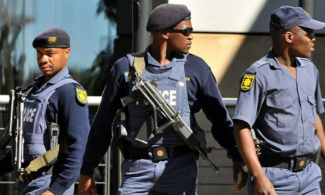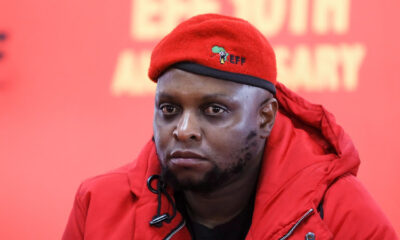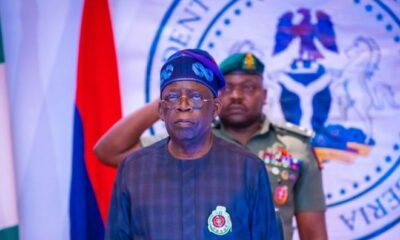Strictly Personal
Proportional representation and secret ballots in SA’s coalition future, By Martin van Staden
Published
1 year agoon

Tshwane was widely regarded as the test case for a stable coalition government: the Democratic Alliance (DA)-led multi-party reformist coalition had a majority in the council and was therefore not dependent on parties aligned with the African National Congress (ANC) or its ideology.
Recent events, particularly the speaker election earlier this month, casts doubt on the success of this experiment.
The reformist coalition had agreed to elect ActionSA’s Kholofelo Morodi as speaker. In the event, the Electoral Commission (IEC) deemed the DA caucus’s 69 votes to be ‘spoiled’ and declared the runner-up, Mncedi Ndzwanana, as speaker. The reason for this can be traced back to a 1998 Act of Parliament forcing council office-bearer elections to be held as secret ballots.
The DA, to identify dissidents who break the party line, required its councillors to mark their votes with an assigned number, thus negating the secrecy of the vote.
Inelegant handling
While the Tshwane coalition has had its ructions, this is not an example of coalition failure. When both Parliament and the IEC have taken steps against a coalition, it is highly unlikely that it would succeed, no matter how well the coalition partners get along.
The DA caucus’ handling of the speaker election was inelegant and, arguably, unlawful. But there is a difference between a spoiled ballot and an unlawful electoral practice.
A spoiled ballot in a free and open democracy is a ballot that does not clearly show how a vote was cast. If it is obvious from the ballot who the voter voted for, the ballot cannot be spoiled unless it was unambiguously communicated to the voter beforehand that voting in a particular way would not be accepted.
The DA caucus’ votes were clear, and as a result, cannot be deemed ‘spoiled’. The IEC has harmed its own legitimacy during a crucial time in South Africa’s democratic development by grasping at straws to arrive at a particular electoral outcome.
Parliamentary diktat
If the IEC has a reason – and in this case, I think it might – to believe the DA caucus conducted itself in contravention of schedule 3 of the Municipal Structures Act of 1998, the correct thing to do would be to approach the courts since this is a legal dispute. If the court is to find in favour of the IEC, the election can be re-run. Legal disputes involving the electoral authority in a free and open democracy are not resolved by unilateral action.
But there is something nefarious about the Municipal Structures Act – a law drawn up by Parliament – dictating rules and procedures to municipal councils. South African constitutional law recognises the principle of subsidiarity, which effectively says that a government function must vest at the lowest (that is, closest to the people) level it can effectively be exercised. There is also a principle of cooperative governance found in section 40(1) of the Constitution, which clearly states the three spheres of government (central, provincial, municipal) are not superior or inferior to one another but are rather ‘interdependent and interrelated’. Parliament is not the ‘boss’ of ‘lower’ assemblies.
Somehow, Parliament figured it could include a provision in the Municipal Structures Act that dictated to municipal councils that speakers, mayors, and others, must be elected on a secret ballot when section 160(6)(b) of the Constitution empowers a municipal council to ‘prescribe rules and orders for its [own] business and proceedings’. Whether or not a secret ballot is utilised is something that an assembly decides for itself on a case-by-case basis. Part A of Schedule 3 of the Constitution, of which schedule 3 of the Municipal Structures Act is in substance a reproduction, unambiguously only applies to institutions in the central and provincial spheres, not municipalities.
Parliament dictating a secret ballot to municipal councils betrays a superiority complex that is without clear constitutional footing. Any legislation the Constitution allows Parliament to adopt regarding municipal councils must be compatible with every other constitutional provision and principle, including subsidiarity and cooperative governance. Indeed, section 151(4) of the Constitution provides that ‘The national or a provincial government may not compromise or impede a municipality’s ability or right to exercise its powers or perform its functions’.
Rules of the game
It seems that Parliament requiring secret ballots in municipal councils might be unconstitutional. But more than that, if one appreciates the fact that coalition politics is the future of South Africa in the municipal, provincial, and central spheres, secret ballots are also unnecessarily disruptive to an already raucous phenomenon.
A secret ballot among political representatives must be distinguished from the firm democratic rule that the public’s votes in elections must be anonymous.
Coalition partners, among themselves and in full view of their voters, must be able to form agreements with one another and hold one another to account. Government must remain respectfully distant from deciding the rules of the coalition game – because, ultimately government itself is a player. The rules of the game are predetermined in the Constitution before the game begins.
When government, via Parliament, introduces disruptive devices like the secret ballot, coalition politics becomes significantly more opaque. Imagine the chaos if the ANC, Economic Freedom Fighters, and Patriotic Alliance formed a majority coalition in 2024 by an enforceable agreement, but the National Assembly, through a secret ballot, elected John Steenhuisen as President and Pieter Groenewald as Speaker.
In this respect, it might also be worth considering a constitutional amendment to Schedule 3 of the Constitution to remove the secret ballot requirement for legislative elections of office-bearers in the central and provincial spheres.
This would only make sense in a proportional representation system like South Africa’s. In such a system, voters bestow a mandate upon a political party, not upon individual candidates. In a constituency system, the phenomenon of allowing an individual representative to ‘vote their conscience’ makes sense because, to a large degree, that is precisely what voters entrusted that representative to do. But a political party has no conscience, and the consciences of its representatives carry no mandates and are therefore largely irrelevant. The electorate must be able to see how the representatives of the party they put in power cast their votes.
You may like
-


South African police arrest 8 Nigerians following attacks on officers
-


SA internet service provider Kaya Konekta launches data access for underserved communities
-


IMF says South Africa needs to do more to cut spending, lower debt-to-GDP ratio
-


South Africa’s crypto firm VALR gets licence to operate as asset service provider
-


Video: South African opposition leader wants accountability within parliament
-


South Africa’s Tiger Brands says its new plant to help cut costs, lower prices
Strictly Personal
Air Peace, capitalism and national interest, By Dakuku Peterside
Published
1 week agoon
April 16, 2024
Nigerian corporate influence and that of the West continue to collide. The rationale is straightforward: whereas corporate activity in Europe and America is part of their larger local and foreign policy engagement, privately owned enterprises in Nigeria or commercial interests are not part of Nigeria’s foreign policy ecosystem, neither is there a strong culture of government support for privately owned enterprises’ expansion locally and internationally.
The relationship between Nigerian businesses and foreign policy is important to the national interest. When backing domestic Nigerian companies to compete on a worldwide scale, the government should see it as a lever to drive foreign policy, and national strategic interest, promote trade, enhance national security considerations, and minimize distortion in the domestic market as the foreign airlines were doing, boost GDP, create employment opportunities, and optimize corporate returns for the firms.
Admitted nations do not always interfere directly in their companies’ business and commercial dealings, and there are always exceptions. I can cite two areas of exception: military sales by companies because of their strategic implications and are, therefore, part of foreign and diplomatic policy and processes. The second is where the products or routes of a company have implications for foreign policy. Air Peace falls into the second category in the Lagos – London route.
Two events demonstrate an emerging trend that, if not checked, will disincentivize Nigerian firms from competing in the global marketplace. There are other notable examples, but I am using these two examples because they are very recent and ongoing, and they are typological representations of the need for Nigerian government backing and support for local companies that are playing in a very competitive international market dominated by big foreign companies whose governments are using all forms of foreign policies and diplomacy to support and sustain.
The first is Air Peace. It is the only Nigerian-owned aviation company playing globally and checkmating the dominance of foreign airlines. The most recent advance is the commencement of flights on the Lagos – London route. In Nigeria, foreign airlines are well-established and accustomed to a lack of rivalry, yet a free-market economy depends on the existence of competition. Nigeria has significantly larger airline profits per passenger than other comparable African nations. Insufficient competition has resulted in high ticket costs and poor service quality. It is precisely this jinx that Air Peace is attempting to break.
On March 30, 2024, Air Peace reciprocated the lopsided Bilateral Air Service Agreement, BASA, between Nigeria and the United Kingdom when the local airline began direct flight operations from Lagos to Gatwick Airport in London. This elicited several reactions from foreign airlines backed by their various sovereigns because of their strategic interest. A critical response is the commencement of a price war. Before the Air Peace entry, the price of international flight tickets on the Lagos-London route had soared to as much as N3.5 million for the economy ticket. However, after Air Peace introduced a return economy class ticket priced at N1.2 million, foreign carriers like British Airways, Virgin Atlantic, and Qatar Airways reduced their fares significantly to remain competitive.
In a price war, there is little the government can do. In an open-market competitive situation such as this, our government must not act in a manner that suggests it is antagonistic to foreign players and competitors. There must be an appearance of a level playing field. However, government owes Air Peace protection against foreign competitors backed by their home governments. This is in the overall interest of the Nigerian consumer of goods and services. Competition history in the airspace works where the Consumer Protection Authority in the host country is active. This is almost absent in Nigeria and it is a reason why foreign airlines have been arbitrary in pricing their tickets. Nigerian consumers are often at the mercy of these foreign firms who lack any vista of patriotism and are more inclined to protect the national interest of their governments and countries.
It would not be too much to expect Nigerian companies playing globally to benefit from the protection of the Nigerian government to limit influence peddling by foreign-owned companies. The success of Air Peace should enable a more competitive and sustainable market, allowing domestic players to grow their network and propel Nigeria to the forefront of international aviation.
The second is Proforce, a Nigerian-owned military hardware manufacturing firm active in Rwanda, Chad, Mali, Ghana, Niger, Burkina Faso, and South Sudan. Despite the growing capacity of Proforce in military hardware manufacturing, Nigeria entered two lopsided arrangements with two UAE firms to supply military equipment worth billions of dollars , respectively. Both deals are backed by the UAE government but executed by UAE firms.
These deals on a more extensive web are not unconnected with UAE’s national strategic interest. In pursuit of its strategic national interest, India is pushing Indian firms to supply military equipment to Nigeria. The Nigerian defence equipment market has seen weaker indigenous competitors driven out due to the combination of local manufacturers’ lack of competitive capacity and government patronage of Asian, European, and US firms in the defence equipment manufacturing sector. This is a misnomer and needs to be corrected.
Not only should our government be the primary customer of this firm if its products meet international standards, but it should also support and protect it from the harsh competitive realities of a challenging but strategic market directly linked to our national military procurement ecosystem. The ability to produce military hardware locally is significant to our defence strategy.
This firm and similar companies playing in this strategic defence area must be considered strategic and have a considerable place in Nigeria’s foreign policy calculations. Protecting Nigeria’s interests is the primary reason for our engagement in global diplomacy. The government must deliberately balance national interest with capacity and competence in military hardware purchases. It will not be too much to ask these foreign firms to partner with local companies so we can embed the technology transfer advantages.
Our government must create an environment that enables our local companies to compete globally and ply their trades in various countries. It should be part of the government’s overall economic, strategic growth agenda to identify areas or sectors in which Nigerian companies have a competitive advantage, especially in the sub-region and across Africa and support the companies in these sectors to advance and grow to dominate in the African region with a view to competing globally. Government support in the form of incentives such as competitive grants ,tax credit for consumers ,low-interest capital, patronage, G2G business, operational support, and diplomatic lobbying, amongst others, will alter the competitive landscape. Governments and key government agencies in the west retain the services of lobbying firms in pursuit of its strategic interest.
Nigerian firms’ competitiveness on a global scale can only be enhanced by the support of the Nigerian government. Foreign policy interests should be a key driver of Nigerian trade agreements. How does the Nigerian government support private companies to grow and compete globally? Is it intentionally mapping out growth areas and creating opportunities for Nigerian firms to maximize their potential? Is the government at the domestic level removing bottlenecks and impediments to private company growth, allowing a level playing field for these companies to compete with international companies?
Why is the government patronising foreign firms against local firms if their products are of similar value? Why are Nigerian consumers left to the hands of international companies in some sectors without the government actively supporting the growth of local firms to compete in those sectors? These questions merit honest answers. Nigerian national interest must be the driving factor for our foreign policies, which must cover the private sector, just as is the case with most developed countries. The new global capitalism is not a product of accident or chance; the government has choreographed and shaped it by using foreign policies to support and protect local firms competing globally. Nigeria must learn to do the same to build a strong economy with more jobs.
Strictly Personal
This is chaos, not governance, and we must stop it, By Tee Ngugi
Published
2 weeks agoon
April 10, 2024
The following are stories that have dominated mainstream media in recent times. Fake fertiliser and attempts by powerful politicians to kill the story. A nation of bribes, government ministries and corporations where the vice is so routine that it has the semblance of policy. Irregular spending of billions in Nairobi County.
Billions are spent in all countries on domestic and foreign travel. Grabbing of land belonging to state corporations, was a scam reminiscent of the Kanu era when even public toilets would be grabbed. Crisis in the health and education sectors.
Tribalism in hiring for state jobs. Return of construction in riparian lands and natural waterways. Relocation of major businesses because of high cost of power and heavy taxation. A tax regime that is so punitive, it squeezes life out of small businesses. Etc, ad nauseam.
To be fair, these stories of thievery, mismanagement, negligence, incompetence and greed have been present in all administrations since independence.
However, instead of the cynically-named “mama mboga” government reversing this gradual slide towards state failure, it is fuelling it.
Alternately, it’s campaigning for 2027 or gallivanting all over the world, evoking the legend of Emperor Nero playing the violin as Rome burned.
A government is run based on strict adherence to policies and laws. It appoints the most competent personnel, irrespective of tribe, to run efficient departments which have clear-cut goals.
It aligns education to its national vision. Its strategies to achieve food security should be driven by the best brains and guided by innovative policies. It enacts policies that attract investment and incentivize building of businesses. It treats any kind of thievery or negligence as sabotage.
Government is not a political party. Government officials should have nothing to do with political party matters. They should be so engaged in their government duties that they literally would not have time for party issues. Government jobs should not be used to reward girlfriends and cronies.
Government is exhausting work undertaken because of a passion to transform lives, not for the trappings of power. Government is not endless campaigning to win the next election. To his credit, Mwai Kibaki left party matters alone until he had to run for re-election.
We have corrupted the meaning of government. We have parliamentarians beholden to their tribes, not to ideas.
We have incompetent and corrupt judges. We have a civil service where you bribe to be served. Police take bribes to allow death traps on our roads. We have urban planners who plan nothing except how to line their pockets. We have regulatory agencies that regulate nothing, including the intake of their fat stomachs.
We have advisers who advise on which tenders should go to whom. There is no central organising ethos at the heart of government. There is no sense of national purpose. We have flurries of national activities, policies, legislation, appointments which don’t lead to meaningful growth. We just run on the same spot.
Tee Ngugi is a Nairobi-based political commentator
EDITOR’S PICK


Egypt reclaims 3,400-year-old stolen statue of King Ramses II
Egypt has received a 3,400-year-old statue depicting the head of King Ramses II that was stolen and smuggled out of...


Sign language interpreter, Kunda, seeks inclusivity in media rights agenda
An inclusive society is crucial for a nation’s human and economic development in the modern era. In this edition of...


Sign language interpreter, Kunda, seeks inclusivity in media rights agenda (video)
An inclusive society is crucial for a nation’s human and economic development in the modern era. In this edition of...


Educationist challenges media freedom norms, cautions against misuse of freedom of expression
Geshom Banda, Deputy Head Teacher at Hillside Primary School, presents a contrasting perspective amidst discussions on media freedom and digital...


Nigerian govt shuts Chinese supermarket over ‘no-Nigerian shopper’ allegation
Nigeria’s Federal Competition and Consumer Protection Commission has shut down a Chinese store in Abuja, the country’s capital, because it...


Nigeria: President Tinubu identifies illegal mining as source of terrorism financing
Nigeria’s President Bola Tinubu has identified illegal mining activities as a major source of terrorism financing in the country and...


Nigeria wants $2.25 billion World Bank loan
Nigeria’s Finance Minister, Wale Edun, has revealed that the country is seeking up to $2.25 billion in World Bank loans...


‘Complex, contentious,’ media enthusiast says media rights often depend on goodwill of political leadership (video)
Kitwe Press Club spokesperson, Michael Kaluba, has described the media landscape in Zambia as complex and contentious. In a conversation...


UN signs MoU with Kenya’s Konza Technopolis
The United Nations has signed a Memorandum of Understanding (MoU) with Kenya’s Konza Technopolis that will provide a wide range...


Ghana mourns as top gospel music icon Koda passes away
The Ghanaian entertainment industry has, once again, been thrown into mourning following the death of renowned gospel musician, Kofi Owusu...
Trending
-

 Behind the News2 days ago
Behind the News2 days agoBehind the News: All the backstories to our major news this week
-

 Metro2 days ago
Metro2 days agoBinance executive who escaped from Nigeria arrested in Kenya
-

 Politics1 day ago
Politics1 day agoAfrican leaders seek change in fight against terrorism at Nigerian summit
-

 Metro15 hours ago
Metro15 hours agoNigerian govt shuts Chinese supermarket over ‘no-Nigerian shopper’ allegation


